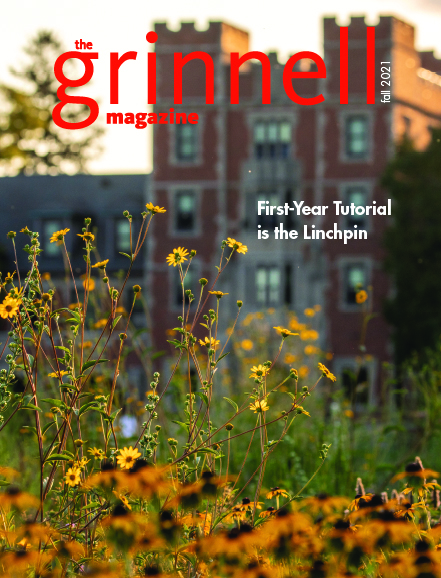
In response to your article, “First-Year Tutorial is the Linchpin” (Fall 2021), I speak as a student who barely missed out on the opportunity. I was a freshman the fall of 1970 when Professor [Beryl] Clotfelter was leading the “no requirement” campaign. My freshmen adviser said “don’t sign up for required courses. We’re about to get rid of them.” I quite frankly thought he was nuts. I had never heard of such a thing. “Get them out of the way” was what I was familiar with. So I knocked out a fine arts and foreign language “requirement.” Those two classes nearly broke me. Thank goodness for pass-fail and a very kind French teacher. And, although the requirements were gone, I still regret the missed opportunity of the freshman tutorial. It was rather sad to hear the incoming freshmen in the remainder of my years at Grinnell speak of their wonderful tutorial experiences.

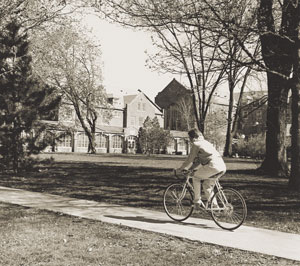 In 1958 I had back surgery over the holiday break from Northwestern University, where I had started as a freshman in September. I didn’t want to go back … somehow, John Zimdars ’62 heard that message and let me know that there was ONE spot for a freshman female at Grinnell. By some miracle, Dr. Merle Goodman came to interview me, and he approved my admission. I was not your typical freshman: I needed an elevator, someone to carry my books and make my bed, couldn't dance or walk very far, and [had] six months of not bending over. I landed in the perfect place, Main Hall, creaky elevator and all, and women who were amazing caregivers. It was the serendipity of my life — Grinnell was made for me, and I’m looking forward to our 60th reunion.
In 1958 I had back surgery over the holiday break from Northwestern University, where I had started as a freshman in September. I didn’t want to go back … somehow, John Zimdars ’62 heard that message and let me know that there was ONE spot for a freshman female at Grinnell. By some miracle, Dr. Merle Goodman came to interview me, and he approved my admission. I was not your typical freshman: I needed an elevator, someone to carry my books and make my bed, couldn't dance or walk very far, and [had] six months of not bending over. I landed in the perfect place, Main Hall, creaky elevator and all, and women who were amazing caregivers. It was the serendipity of my life — Grinnell was made for me, and I’m looking forward to our 60th reunion.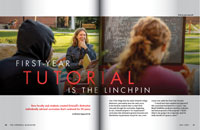 I read with interest your story about the First-Year Tutorial in the Fall 2021 issue. When I enrolled at Grinnell College in 1972, it was called the freshman tutorial. I did not know until I read the story last fall that the tutorial had begun just a year earlier, in 1971. Fast-forward about 35 years. Despite my liberal arts education, in my early 50s I applied for and was awarded a job managing power plants for a large electric cooperative. Deciding that I needed to know more about power plants, I applied for admission to an online associate degree program in power plant technology at a community college in North Dakota. I submitted my Grinnell College transcript and was exempted from all the general education requirements except one — freshman composition. No such course appeared on my Grinnell College transcript, so I was told I would have to take freshman composition to improve my writing skills, despite my bachelor’s from Grinnell College, my master’s, and various successfully completed career-related writing assignments. After learning of my situation, Margaret Bogie ’76 sent me a copy of the 1971 Grinnell College Catalog page that contained a description of the freshman tutorial. I submitted that page to the community college registrar and was then exempted from freshman composition. I successfully completed the degree and continued to manage power plants until my retirement in 2019. Thank you, Grinnell College freshman tutorial, for getting me exempted from freshman composition 35 years later.
I read with interest your story about the First-Year Tutorial in the Fall 2021 issue. When I enrolled at Grinnell College in 1972, it was called the freshman tutorial. I did not know until I read the story last fall that the tutorial had begun just a year earlier, in 1971. Fast-forward about 35 years. Despite my liberal arts education, in my early 50s I applied for and was awarded a job managing power plants for a large electric cooperative. Deciding that I needed to know more about power plants, I applied for admission to an online associate degree program in power plant technology at a community college in North Dakota. I submitted my Grinnell College transcript and was exempted from all the general education requirements except one — freshman composition. No such course appeared on my Grinnell College transcript, so I was told I would have to take freshman composition to improve my writing skills, despite my bachelor’s from Grinnell College, my master’s, and various successfully completed career-related writing assignments. After learning of my situation, Margaret Bogie ’76 sent me a copy of the 1971 Grinnell College Catalog page that contained a description of the freshman tutorial. I submitted that page to the community college registrar and was then exempted from freshman composition. I successfully completed the degree and continued to manage power plants until my retirement in 2019. Thank you, Grinnell College freshman tutorial, for getting me exempted from freshman composition 35 years later.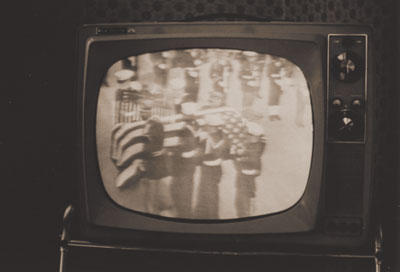 I was playing bridge, which is something I usually did after lunch and before class, in Smith Hall lounge. Someone came into the lounge and said JFK was shot. I don’t remember who turned on the TV and turned on NBC, which was airing a soap. Within seconds, NBC switched to a news special from Dallas. Since our lounge was very near Central Campus, it filled to standing room only within minutes. Except for the news anchor, the [silence] in the Lounge was deafening. Several hours later, I walked to the library because I left some of my books there. The flag [was] at half-staff and the only other living being in Central Campus was Fang, the stray dog.
I was playing bridge, which is something I usually did after lunch and before class, in Smith Hall lounge. Someone came into the lounge and said JFK was shot. I don’t remember who turned on the TV and turned on NBC, which was airing a soap. Within seconds, NBC switched to a news special from Dallas. Since our lounge was very near Central Campus, it filled to standing room only within minutes. Except for the news anchor, the [silence] in the Lounge was deafening. Several hours later, I walked to the library because I left some of my books there. The flag [was] at half-staff and the only other living being in Central Campus was Fang, the stray dog.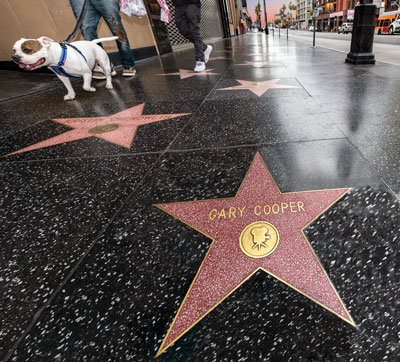 Yes, Gary Cooper ’26 is a Grinnell College alumnus. He earned the coveted pink and brass star on Hollywood’s Walk of Fame for his five Academy Award nominations, including best actor for High Noon and Sergeant York. Born in Montana, he transferred from Wesleyan College in Helena to Grinnell in 1922. There’s a legend he was rejected by Grinnell’s drama club for stage fright and stuttering. Erin Peterson ’98 did some deep archival research for a Grinnell Magazine article about a decade ago and confirmed this was actually true. She even found evidence that the club snubbed him multiple times. Failure — being the best preparation for success — led him to adopt a laconic, restrained, yet intense persona suited to popular Hollywood westerns.
Yes, Gary Cooper ’26 is a Grinnell College alumnus. He earned the coveted pink and brass star on Hollywood’s Walk of Fame for his five Academy Award nominations, including best actor for High Noon and Sergeant York. Born in Montana, he transferred from Wesleyan College in Helena to Grinnell in 1922. There’s a legend he was rejected by Grinnell’s drama club for stage fright and stuttering. Erin Peterson ’98 did some deep archival research for a Grinnell Magazine article about a decade ago and confirmed this was actually true. She even found evidence that the club snubbed him multiple times. Failure — being the best preparation for success — led him to adopt a laconic, restrained, yet intense persona suited to popular Hollywood westerns.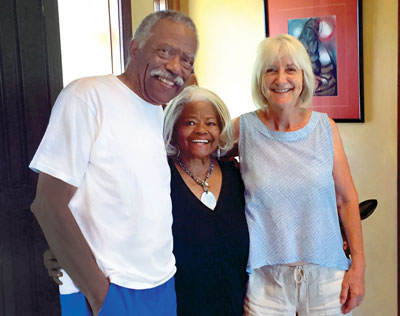
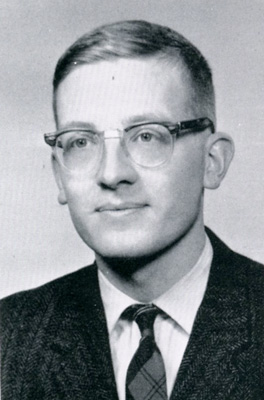 I was sorry to hear of the death of Professor Jim Magee in late 2019. I took Professor Magee’s course in international politics at Grinnell in, I think, 1967 or 1968. Although I hadn’t been especially keen on the subject, he made it interesting. He was energetic and enthusiastic. He was especially good at helping us understand the motivations of countries who opposed us. He explained the very sensible and practical reasons why our enemies (mostly the Soviet Union at the time) did not want to do what we wanted them to. They saw things differently and did not see cooperating with the United States as always being in their best interests. After his lectures, we understood why. This approach has served me well. Professor Magee was also a warm, kind man.
I was sorry to hear of the death of Professor Jim Magee in late 2019. I took Professor Magee’s course in international politics at Grinnell in, I think, 1967 or 1968. Although I hadn’t been especially keen on the subject, he made it interesting. He was energetic and enthusiastic. He was especially good at helping us understand the motivations of countries who opposed us. He explained the very sensible and practical reasons why our enemies (mostly the Soviet Union at the time) did not want to do what we wanted them to. They saw things differently and did not see cooperating with the United States as always being in their best interests. After his lectures, we understood why. This approach has served me well. Professor Magee was also a warm, kind man.